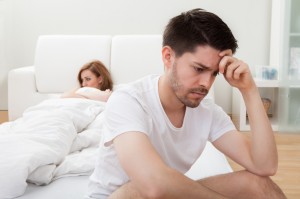 Unfortunately, depression is very common – ten percent of adults in the United States are struggling with some level of depression at any given time, according to recent statistics. That means even if only one-quarter of depressed adults are in a relationship, a high percentage of people are affected one way or another.
Unfortunately, depression is very common – ten percent of adults in the United States are struggling with some level of depression at any given time, according to recent statistics. That means even if only one-quarter of depressed adults are in a relationship, a high percentage of people are affected one way or another.
Which Came First?
Although not talked about very much, depression can not only dramatically affect someone’s life, it can eventually devastate a relationship. A tricky part of dealing with the problem is that often the non-depressed, or “healthy” partner, may not be aware of what’s happening. They may notice that their significant other is distant, or showing other depressive symptoms, but not sure why. Are problems in the relationship causing the depression, or is the depression negatively impacting the relationship? Or is it some combination of the two?
Depression can clearly make relationship problems worse, but also makes it hard for an intervening therapist to figure out exactly what’s going on. Sadness, irritability, anger, decreased libido, and decreased motivation, along with being critical and argumentative, are all symptoms partners may exhibit when depressed and/or experiencing problems in the relationship. A lack of communication and general withdrawal from life and their significant other, are concurrent signs of both individual and partnership trouble.
Gender Differences
There are also characteristic gender differences in depressive symptoms. Men tend to act out more, either in angry outbursts or other abusive behavior (physically or verbally). Women have a tendency to turn inward when depressed, sinking into despair or otherwise internalizing their emotions.
Gender differences surface in counseling as well. Men are often reluctant to acknowledge and talk about their problems. Stereotypically, they struggle with exposing any vulnerability. The hesitancy to ask for assistance means that depressed men are more likely to go untreated, and this is often the case regarding their physical as well as mental health. Women are generally more open to discussing problem issues, and are more likely to seek professional help. They may already be in individual therapy and/or under medical care for their symptoms prior to seeing a marriage counselor. Severe depression, for both sexes, is usually best treated with a combination of antidepressant drugs and psychotherapy.
Couples Counseling
When in couples counseling, the first step is to identify if one partner is depressed. When the depressed partner readily acknowledges his or her mood, communication in the relationship can improve. This can be challenging, however, when the depression is not recognized and discussed by either or both partners. It’s also important to not assume that depression is the main cause of the relationship problems. Even if one partner is significantly depressed, both partners in the relationship are contributing to their relationship issues.
After the problem is identified, it is important to formulate a plan together on how to deal with the depression. The couple needs to determine both individual as well as a relational plans to restore their connection.
Helping Your Depressed Partner
Often it is important that the depressed partner attend individual counseling. Also, it is usually a good idea for them to schedule an appointment with their family physician for a complete exam, to rule out any physical factors that could possibly be causing or contributing to their symptoms. A family doctor may also prescribe an antidepressant (or refer the partner to a psychiatrist) if the depression is severe.
In addition, it is important that the non-depressed partner begin educating him or herself about depression and its symptoms. Please see the following resource on depression. In couples therapy, it is important for the non-depressed partner to learn how his or her behavior may be exacerbating the situation and contributing to the relationship difficulties.
Although it can be daunting and even feel hopeless at times, with open and honest communication, well-formulated plans of action, and a therapist’s guidance, the ability to recover from a partner’s depression in a relationship is an achievable goal.